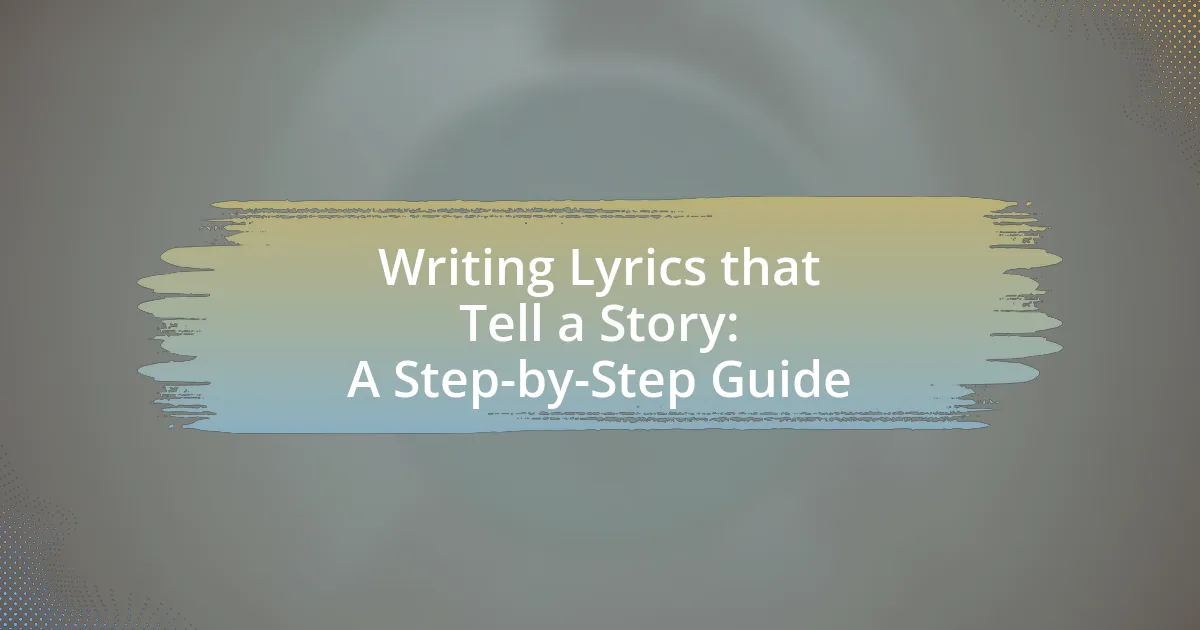Developing a unique voice in songwriting is essential for artists to distinguish themselves in a competitive music industry. This article explores the significance of a distinct style and perspective, emphasizing how personal experiences, emotions, and musical influences shape an artist’s individuality. Key elements contributing to a unique voice include innovative lyrical styles, experimentation with genres, and the importance of authenticity. Additionally, the article addresses common challenges songwriters face, such as self-doubt and external pressures, while providing practical strategies for maintaining and cultivating a unique artistic identity.

What does it mean to develop a unique voice in your songwriting?
Developing a unique voice in songwriting means creating a distinct style and perspective that sets an artist apart from others. This involves combining personal experiences, emotions, and influences to craft lyrics and melodies that resonate authentically with listeners. A unique voice often reflects an artist’s individuality, allowing them to express their thoughts and feelings in a way that feels genuine and relatable. For example, artists like Bob Dylan and Joni Mitchell are celebrated for their unique voices, which blend personal storytelling with innovative musical elements, making their work instantly recognizable and impactful.
Why is having a unique voice important for songwriters?
Having a unique voice is crucial for songwriters because it distinguishes their work in a saturated music industry. A distinctive voice allows songwriters to express their individual perspectives and emotions, making their songs relatable and memorable to listeners. For instance, artists like Bob Dylan and Taylor Swift have achieved significant success by showcasing their unique storytelling styles, which resonate deeply with audiences. This differentiation not only attracts a loyal fan base but also enhances the songwriter’s marketability, as originality is often a key factor in commercial success.
How does a unique voice differentiate a songwriter in the music industry?
A unique voice differentiates a songwriter in the music industry by establishing a distinct identity that resonates with audiences. This individuality allows songwriters to create memorable and relatable content, setting them apart from others in a saturated market. For instance, artists like Bob Dylan and Taylor Swift are recognized for their unique lyrical styles and personal storytelling, which have garnered them dedicated fan bases and critical acclaim. The ability to convey emotions and experiences in a way that feels authentic contributes to a songwriter’s marketability and longevity in the industry.
What impact does a unique voice have on audience connection?
A unique voice significantly enhances audience connection by fostering authenticity and relatability. When artists express their individuality through distinct vocal styles or lyrical content, they create a memorable experience that resonates with listeners. Research indicates that audiences are more likely to engage with and remember music that feels genuine, as it evokes emotional responses and personal connections. For instance, a study published in the Journal of Personality and Social Psychology found that people are drawn to authentic expressions, which can lead to stronger emotional bonds with the artist and their work. Thus, a unique voice not only differentiates an artist but also deepens the connection with their audience.
What are the key elements that contribute to a unique songwriting voice?
A unique songwriting voice is primarily shaped by personal experiences, distinctive lyrical style, and innovative musical composition. Personal experiences provide authenticity and emotional depth, allowing songwriters to connect with listeners on a personal level. A distinctive lyrical style often includes unique phrasing, imagery, and themes that reflect the songwriter’s perspective, setting them apart from others. Innovative musical composition involves experimenting with melodies, harmonies, and structures that challenge conventional norms, further establishing a songwriter’s individuality. These elements collectively contribute to a recognizable and compelling songwriting voice that resonates with audiences.
How do personal experiences shape a songwriter’s voice?
Personal experiences significantly shape a songwriter’s voice by providing authentic emotional content and unique perspectives. These experiences, whether joyful or traumatic, influence the themes, lyrics, and melodies a songwriter creates. For instance, Taylor Swift often draws from her personal relationships and life events, which resonate with listeners and contribute to her distinctive storytelling style. This connection between personal narrative and artistic expression is supported by research indicating that artists who incorporate their lived experiences into their work tend to create more relatable and impactful art.
What role do musical influences play in developing a unique voice?
Musical influences play a crucial role in developing a unique voice by providing a foundation of styles, techniques, and emotional expressions that artists can draw upon. These influences shape an artist’s understanding of melody, rhythm, and lyrical content, allowing them to blend various elements into their own distinctive sound. For instance, artists like Bob Dylan and Joni Mitchell have cited diverse influences, from folk to rock, which contributed to their unique songwriting styles. This blending of influences not only fosters creativity but also helps artists to differentiate themselves in a saturated music landscape, as seen in the varied genres emerging from artists who incorporate multiple influences into their work.
How can songwriters identify their unique voice?
Songwriters can identify their unique voice by exploring personal experiences, experimenting with different musical styles, and analyzing their lyrical themes. Personal experiences provide authentic material that resonates with listeners, while experimentation allows songwriters to discover what feels most natural and expressive for them. Analyzing lyrical themes helps songwriters recognize patterns and preferences in their writing, further clarifying their distinctive voice. Research indicates that artists who engage in self-reflection and diverse creative practices are more likely to develop a unique artistic identity, as seen in studies on creativity and self-expression in music.
What techniques can songwriters use to explore their individuality?
Songwriters can explore their individuality through techniques such as personal storytelling, genre blending, and unique lyrical structures. Personal storytelling allows songwriters to draw from their own experiences, emotions, and perspectives, creating authentic narratives that resonate with listeners. For instance, artists like Taylor Swift have effectively used autobiographical elements in their lyrics to establish a distinct voice. Genre blending enables songwriters to combine different musical styles, fostering innovation and originality; for example, Lil Nas X’s “Old Town Road” merges country and hip-hop, showcasing a unique artistic identity. Additionally, experimenting with lyrical structures, such as unconventional rhyme schemes or varying song formats, can further distinguish a songwriter’s work, as seen in the innovative approaches of artists like Björk. These techniques collectively contribute to the development of a unique voice in songwriting.
How can feedback from others help in recognizing a unique voice?
Feedback from others can significantly aid in recognizing a unique voice by providing external perspectives that highlight strengths and areas for improvement. When songwriters receive constructive criticism, they can identify patterns in their work that resonate with listeners, which may not be apparent to them. For instance, feedback can reveal specific lyrical themes or stylistic choices that stand out, helping the songwriter to refine and emphasize their individuality. Studies in music psychology indicate that external validation can enhance self-awareness, allowing artists to better understand how their work is perceived in relation to their personal style.

What strategies can songwriters use to cultivate their unique voice?
Songwriters can cultivate their unique voice by experimenting with diverse musical styles and lyrical themes. This approach allows them to discover what resonates personally and artistically, leading to a distinctive sound. For instance, artists like Bob Dylan and Joni Mitchell have successfully blended various genres, which contributed to their unique identities in music. Additionally, maintaining a consistent writing routine helps songwriters refine their skills and develop their voice over time. Research indicates that regular practice enhances creativity and originality, as seen in studies on artistic development. By combining these strategies, songwriters can effectively carve out their unique artistic identity.
How can songwriters experiment with different styles and genres?
Songwriters can experiment with different styles and genres by actively engaging in diverse musical influences and techniques. This can involve listening to a wide range of music, analyzing the structure and elements of various genres, and incorporating those elements into their own work. For instance, a songwriter might blend country storytelling with hip-hop rhythms, creating a unique fusion that reflects both styles. Research indicates that exposure to varied musical genres enhances creativity and innovation in songwriting, as demonstrated in studies by the University of California, which found that musicians who explore multiple genres develop a broader skill set and more original compositions.
What are the benefits of cross-genre experimentation?
Cross-genre experimentation enhances creativity and broadens artistic expression in songwriting. By blending elements from different genres, songwriters can create innovative sounds that resonate with diverse audiences. This approach fosters originality, as it encourages artists to step outside conventional boundaries and explore new musical landscapes. For instance, artists like Billie Eilish have successfully merged pop with electronic and indie influences, resulting in a distinctive style that has garnered widespread acclaim. Additionally, cross-genre experimentation can attract a wider fan base, as it appeals to listeners from various musical backgrounds, ultimately increasing an artist’s reach and impact in the music industry.
How can songwriters incorporate diverse influences into their work?
Songwriters can incorporate diverse influences into their work by actively exploring various musical genres, cultural traditions, and lyrical themes. This approach allows them to blend different styles, creating a unique sound that reflects a broader spectrum of experiences. For instance, artists like Shakira fuse Latin rhythms with pop elements, demonstrating how cross-genre experimentation can lead to innovative music. Additionally, studying the works of diverse artists and collaborating with musicians from different backgrounds can provide fresh perspectives and inspire new songwriting techniques. This practice not only enriches the songwriter’s palette but also resonates with a wider audience, as seen in the global success of artists who embrace multicultural influences.
What writing exercises can help develop a unique voice?
Writing exercises that can help develop a unique voice include free writing, character exploration, and perspective shifts. Free writing encourages writers to express thoughts without self-censorship, allowing for authentic expression and the emergence of a personal style. Character exploration involves writing from the perspective of different characters, which can reveal unique narrative voices and enhance creativity. Perspective shifts, such as rewriting a scene from various viewpoints, help writers discover distinct tones and styles, contributing to a more individualized voice. These exercises are supported by the understanding that varied practice fosters originality, as noted in studies on creative writing techniques.
How does free writing contribute to voice development?
Free writing significantly contributes to voice development by allowing writers to express thoughts and emotions without the constraints of structure or judgment. This unfiltered expression fosters authenticity, enabling individuals to discover their unique style and perspective. Research indicates that free writing can enhance creativity and self-awareness, which are essential components of developing a distinctive voice in songwriting. For instance, a study published in the Journal of Creative Behavior found that engaging in free writing exercises increased participants’ creative output and confidence in their writing abilities, reinforcing the idea that such practices are beneficial for voice development.
What role does rewriting play in refining a unique voice?
Rewriting plays a crucial role in refining a unique voice by allowing songwriters to critically assess and enhance their lyrical and melodic choices. Through the process of rewriting, songwriters can experiment with different expressions, structures, and word choices, which helps to clarify their artistic intent and individuality. This iterative process not only fosters creativity but also enables the songwriter to identify and eliminate clichés, thereby strengthening their distinct style. Research indicates that many successful songwriters, such as Bob Dylan and Taylor Swift, emphasize rewriting as a key component in their creative process, illustrating its effectiveness in developing a recognizable and authentic voice.
How can collaboration enhance a songwriter’s unique voice?
Collaboration can enhance a songwriter’s unique voice by introducing diverse perspectives and ideas that enrich the creative process. When songwriters work with others, they can blend different musical styles, lyrical themes, and emotional expressions, which can lead to innovative compositions that reflect a broader range of experiences. For instance, a study published in the Journal of Creative Behavior found that collaborative songwriting often results in more varied and complex musical structures compared to solo efforts. This diversity not only helps songwriters discover new facets of their own voice but also encourages them to experiment with different genres and techniques, ultimately leading to a more distinctive and authentic artistic identity.
What are the advantages of co-writing with other artists?
Co-writing with other artists enhances creativity and broadens perspectives in songwriting. Collaborating allows artists to combine different styles, experiences, and ideas, resulting in more innovative and diverse musical compositions. Research indicates that collaboration can lead to higher-quality outcomes; for instance, a study published in the Journal of Creative Behavior found that collaborative efforts often produce more original and effective creative works compared to solo endeavors. Additionally, co-writing fosters networking opportunities, which can lead to increased exposure and career advancement in the music industry.
How can collaboration lead to new perspectives on one’s voice?
Collaboration can lead to new perspectives on one’s voice by exposing individuals to diverse ideas and techniques that challenge their existing beliefs about their creative expression. When songwriters work together, they share their unique experiences and styles, which can inspire new approaches and insights into their own voice. For instance, a study published in the Journal of Creative Behavior found that collaborative environments foster innovation by combining different viewpoints, leading to enhanced creativity. This interaction not only broadens the songwriter’s understanding of their own capabilities but also encourages experimentation, ultimately resulting in a more distinctive and evolved artistic voice.

What common challenges do songwriters face in developing their unique voice?
Songwriters commonly face challenges such as self-doubt, lack of originality, and difficulty in finding their authentic style. Self-doubt can hinder creativity, as songwriters may question their abilities or the value of their work. Lack of originality arises from the overwhelming influence of existing music, making it hard for songwriters to distinguish their voice. Additionally, the process of experimenting with different styles and techniques can be daunting, leading to frustration and inconsistency in their output. These challenges are well-documented in studies on creativity, which highlight the psychological barriers that artists encounter in their pursuit of a unique artistic identity.
How can self-doubt hinder the development of a unique voice?
Self-doubt can significantly hinder the development of a unique voice by causing individuals to second-guess their creative choices and conform to external expectations. When songwriters experience self-doubt, they may avoid taking risks or exploring unconventional ideas, leading to a reliance on clichés and popular trends instead of authentic expression. Research indicates that self-doubt can diminish creative output; for instance, a study published in the Journal of Creative Behavior found that individuals with high self-doubt often produce less original work due to fear of judgment. This cycle of insecurity stifles innovation and prevents the emergence of a distinctive artistic identity.
What strategies can help overcome self-doubt in songwriting?
To overcome self-doubt in songwriting, writers can employ strategies such as setting realistic goals, seeking constructive feedback, and practicing mindfulness. Setting realistic goals helps songwriters focus on achievable milestones, reducing the pressure that often fuels self-doubt. Seeking constructive feedback from trusted peers or mentors provides valuable perspectives that can affirm a songwriter’s abilities and encourage growth. Practicing mindfulness techniques, such as meditation or journaling, can help manage anxiety and foster a positive mindset, allowing songwriters to connect more authentically with their creative process. These strategies are supported by research indicating that goal-setting enhances motivation and performance (Locke & Latham, 2002), while mindfulness practices have been shown to reduce anxiety and improve creative output (Keng, Smoski, & Robins, 2011).
How can comparison to other artists affect a songwriter’s voice?
Comparison to other artists can significantly influence a songwriter’s voice by either inspiring originality or leading to imitation. When songwriters analyze the styles and techniques of their peers, they may adopt certain elements that resonate with them, which can enhance their creative expression. However, excessive comparison can result in a lack of authenticity, as songwriters might prioritize fitting into established molds rather than developing their unique sound. Research indicates that artists who focus on their individuality, rather than constantly measuring themselves against others, tend to produce more innovative and personal work, as seen in studies on creative identity in music (Hargreaves & North, 2001).
What external pressures can impact a songwriter’s unique voice?
External pressures that can impact a songwriter’s unique voice include commercial expectations, industry trends, and audience preferences. Commercial expectations often push songwriters to conform to popular styles or themes, which can dilute their individuality. Industry trends, such as the rise of specific genres or production techniques, can also compel songwriters to adapt their sound to remain relevant. Additionally, audience preferences may lead songwriters to prioritize mass appeal over personal expression, further affecting their unique voice. These pressures can create a tension between artistic integrity and marketability, ultimately influencing the songwriter’s creative output.
How does industry expectation influence creative expression?
Industry expectation significantly influences creative expression by shaping the themes, styles, and formats that artists pursue in their work. For instance, record labels often prioritize commercially viable music, which can lead songwriters to conform to popular trends rather than explore innovative or personal themes. This pressure is evident in the music charts, where songs that align with current industry standards frequently dominate, as seen in the Billboard Hot 100, where formulaic pop structures often prevail. Consequently, artists may feel compelled to sacrifice their unique voice to meet these expectations, impacting the authenticity of their creative output.
What can songwriters do to stay true to their voice despite external pressures?
Songwriters can stay true to their voice despite external pressures by regularly engaging in self-reflection and prioritizing authenticity in their work. This practice allows them to identify their unique style and emotional truths, which can be reinforced through consistent writing routines that focus on personal experiences and feelings. Research indicates that artists who maintain a strong sense of identity in their creative process are more likely to produce work that resonates with their audience, as seen in studies on artistic integrity and audience connection. By setting boundaries around external influences, such as trends or commercial expectations, songwriters can cultivate a creative environment that fosters their individual voice.
What practical tips can help songwriters maintain their unique voice?
To maintain a unique voice, songwriters should regularly engage in self-reflection and experimentation with different styles and genres. Self-reflection allows songwriters to identify their personal experiences and emotions that shape their artistic identity, while experimentation encourages the exploration of new sounds and techniques, preventing stagnation. For instance, a study by the University of Southern California found that artists who diversify their creative practices tend to develop a more distinctive style over time. This combination of introspection and innovation helps songwriters cultivate and sustain their unique voice in a competitive industry.
How can regular practice contribute to voice development?
Regular practice significantly enhances voice development by improving vocal technique, range, and control. Consistent vocal exercises strengthen the vocal cords, leading to increased stamina and flexibility, which are essential for effective singing. Research indicates that singers who engage in daily practice show marked improvements in pitch accuracy and vocal quality over time, as evidenced by studies conducted by the National Association of Teachers of Singing. These improvements stem from the physiological adaptations that occur in the vocal apparatus with regular use, allowing for a more expressive and unique vocal style in songwriting.
What role does authenticity play in sustaining a unique voice?
Authenticity is crucial in sustaining a unique voice as it fosters genuine expression and emotional connection. When songwriters remain true to their experiences and perspectives, they create music that resonates deeply with listeners, distinguishing their work from others. Research indicates that artists who convey authentic narratives often achieve greater audience engagement and loyalty, as seen in the success of musicians like Taylor Swift, whose personal storytelling has garnered a dedicated fan base. This connection reinforces the importance of authenticity in maintaining a distinctive artistic identity.





